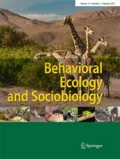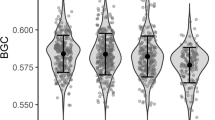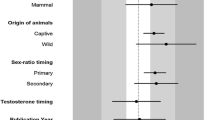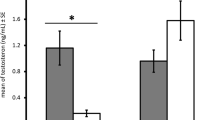Abstract
Hormones of maternal origin transferred to the eggs of oviparous species have been shown to significantly affect offspring development. Furthermore, there is now increasing evidence that these effects may last into adulthood. This underlines the persistence of yolk hormone-mediated maternal effects as well as their trans-generational potential as these changes may involve fitness-related traits such as mate choice behaviour, reproductive traits and longevity. Here, we tested the potential of yolk testosterone to affect sexual selection by experimentally increasing the yolk testosterone levels via egg injections. We focused on two central axes of sexual selection, male–male competition for access to a female (intra-sexual selection) and female mate choice behaviour (inter-sexual selection), using canaries (Serinus canaria) as a model species. Neither male agonistic behaviour nor access to the opposite sex, as measured in staged male–male encounters in the presence of a female, were affected by experimentally elevating yolk testosterone levels. We did not find any evidence for effects on female mate choice behaviour either, given the lack of significant effects on mate choice activity, consistency in female mate choice or choosiness. In conclusion, our results indicate that the consequences of yolk testosterone for sexual selection through changes in behavioural traits, which are expressed during pair formation or male–male competition, are probably limited.


Similar content being viewed by others
References
Bonisoli-Alquati A, Matteo A, Ambrosini R, Rubolini D, Romano M, Caprioli M, Dessi-Fulgheri F, Baratti M, Saino N (2011a) Effects of egg testosterone on female mate choice and male sexual behavior in the pheasant. Horm Behav 59:75–82
Bonisoli-Alquati A, Rubolini D, Caprioli M, Ambrosini R, Romano M, Saino N (2011b) Egg testosterone affects wattle color and trait covariation in the ring-necked pheasant. Behav Ecol Sociobiol 65:1779–1790
Burley NT, Foster VS (2004) Digit ratio varies with sex, egg order and strength of mate preference in zebra finches. Proc R Soc Lond B 271:239–244
Cucco M, Guasco B, Malacarne G, Ottonelli R, Tanvez A (2008) Yolk testosterone levels and dietary carotenoids influence growth and immunity of grey partridge chicks. Gen Comp Endocrinol 156:418–425
Daisley JN, Bromundt V, Mostl E, Kotrschal K (2005) Enhanced yolk testosterone influences behavioral phenotype independent of sex in Japanese quail chicks Coturnix japonica. Horm Behav 47:185–194
Eising CM, Eikenaar C, Schwabl H, Groothuis TGG (2001) Maternal androgens in black-headed gull (Larus ridibundus) eggs: consequences for chick development. Proc R Soc Lond B 268:839–846
Eising CM, Groothuis TGG (2003) Yolk androgens and begging behaviour in black-headed gull chicks: an experimental field study. Anim Behav 66:1027–1034
Eising CM, Müller W, Groothuis TGG (2006) Avian mothers create different phenotypes by hormone deposition in their eggs. Biol Lett 2:20–22
Forstmeier W, Coltman DW, Birkhead TR (2004) Maternal effects influence the sexual behavior of sons and daughters in the zebra finch. Evolution 58:2574–2583
Gil D (2003) Golden eggs: maternal manipulation of offspring phenotype by egg androgen in birds. Ardeola 50:281–294
Gil D (2008) Hormones in avian eggs: physiology, ecology and behavior. Adv Stud Behav 38:337–398
Groothuis TGG, Müller W, von Engelhardt N, Carere C, Eising C (2005a) Maternal hormones as a tool to adjust offspring phenotype in avian species. Neurosci Biobehav Rev 29:329–352
Groothuis TGG, Eising CM, Dijkstra C, Müller W (2005b) Balancing between costs and benefits of maternal hormone deposition in avian eggs. Biol Lett 1:78–81
Groothuis TGG, Schwabl H (2008) Hormone-mediated maternal effects in birds: mechanisms matter but what do we know of them? Philos Trans R Soc B 363:1647–1661
Holveck MJ, Riebel K (2010) Low-quality females prefer low-quality males when choosing a mate. Proc R Soc Lond B 277:153–160
Lipar JL, Ketterson ED (2000) Maternally derived yolk testosterone enhances the development of the hatching muscle in the red-winged blackbird Agelaius phoeniceus. Proc R Soc Lond B 267:2005–2010
McFadden D, Schubel E (2002) Relative lengths of fingers and toes in human males and females. Horm Behav 42:492–500
McGlothlin JW, Neudorf DLH, Casto JM, Nolan V, Ketterson ED (2004) Elevated testosterone reduces choosiness in female dark-eyed juncos (Junco hyemalis): evidence for a hormonal constraint on sexual selection? Proc R Soc Lond B 271:1377–1384
Müller W, Groothuis TGG, Dijkstra C, Kasprzik A, Alatalo RV, Siitari H (2005) Prenatal androgen exposure modulates cellular and humoral immune function of black-headed gull chicks. Proc R Soc Lond B 272:1971–1977
Müller W, Deptuch K, Lopez-Rull I, Gil D (2007) Elevated yolk androgen levels benefit offspring development in a between-clutch context. Behav Ecol 18:929–936
Müller W, Vergauwen J, Eens M (2008) Yolk testosterone, postnatal growth and song in male canaries. Horm Behav 54:125–133
Müller W, Eens M (2009) Elevated yolk androgen levels and the expression of multiple sexually selected male characters. Horm Behav 55:175–181
Müller W, Dijkstra C, Groothuis TGG (2009) Maternal yolk androgens stimulate territorial behaviour in black-headed gull chicks. Biol Lett 5:586–588
Müller W, Boonen S, Groothuis TGG, Eens M (2010) Maternal yolk testosterone in canary eggs: towards a better understanding of mechanism and function. Behav Ecol 21:493–500
Naguib M, Nemitz A (2007) Living with the past: nutritional stress in juvenile males has immediate effects on their plumage ornaments and on adult attractiveness in zebra finches. PLoS ONE 2:e901
Nakagawa S, Schielzeth H (2010) Repeatability for Gaussian and non-Gaussian data: a practical guide for biologists. Biol Rev 85:935–956
Navara KJ, Hill GE, Mendonca MT (2005) Variable effects of yolk androgens on growth, survival, and immunity in eastern bluebird nestlings. Physiol Biochem Zool 78:570–578
Okuliarova M, Skrobanek P, Zeman M (2007) Effect of increasing yolk testosterone levels on early behaviour in Japanese quail hatchlings. Acta Vet BRNO 76:325–331
Partecke J, Schwabl H (2008) Organizational effects of maternal testosterone on reproductive behavior of adult house sparrows. Dev Neurobiol 68:1538–1548
Pfannkuche KA, Gahr M, Weites IM, Riedstra B, Wolf C, Groothuis TGG (2011) Examining a pathway for hormone mediated maternal effects—yolk testosterone affects androgen receptor expression and endogenous testosterone production in young chicks (Gallus gallus domesticus). Gen Comp Endocrinol 172:487–493
Riedstra B, Pfannkuche KA, Groothuis TGG (2013) Increased exposure to yolk testosterone has feminizing effects in chickens (Gallus gallus domesticus). Anim Behav 85:701–708
Romano M, Rubolini D, Martinelli R, Bonisoli-Alquati A, Saino N (2005) Experimental manipulation of yolk testosterone affects digit length ratios in the ring-necked pheasant (Phasianus colchicus). Horm Behav 48:342–346
Rubolini D, Romano M, Martinelli R, Leoni B, Saino N (2006) Effects of prenatal yolk androgens on armaments and ornaments of the ring-necked pheasant. Behav Ecol Sociobiol 59:549–560
Rubolini D, Martinelli R, von Engelhardt N, Romano M, Groothuis TGG, Fasola M, Saino N (2007) Consequences of prenatal androgen exposure for the reproductive performance of female pheasants (Phasianus colchicus). Proc R Soc Lond B 274:137–142
Rubolini D, Fusani L, Bonisoli-Alquati A, Canoine V, Caprioli M, Romano M, Ambrosini R, Dessì-Fulgheri F, Saino N (2014) Effects of egg and circulating testosterone on ring-necked pheasant (Phasianus colchicus) male traits and combat outcome. Ethology 120:64–76
Rutkowska J, Wilk T, Cichon M (2007) Androgen-dependent maternal effects on offspring fitness in zebra finches. Behav Ecol Sociobiol 61:1211–1217
Ruuskanen S, Helle S, Ahola M, Adamczyck F, Mostl E, Laaksonen T (2011) Digit ratios have poor indicator value in a wild bird population. Behav Ecol Sociobiol 65:983–994
Ruuskanen S, Laaksonen T (2010) Yolk hormones have sex-specific long-term effects on behavior in the pied flycatcher (Ficedula hypoleuca). Horm Behav 57:119–127
Ruuskanen S, Lehikoinen E, Nikinmaa M, Siitari H, Waser W, Laaksonen T (2013) Long-lasting effects of yolk androgens on phenotype in the pied flycatcher (Ficedula hypoleuca). Behav Ecol Sociobiol 67:361–372
Schielzeth H, Burger C, Bolund E, Forstmeier W (2008) Sexual imprinting on continuous variation: do female zebra finches prefer or avoid unfamiliar sons of their foster parents? J Evol Biol 21:1274–1280
Schwabl H (1993) Yolk is a source of maternal testosterone for developing birds. Proc Natl Acad Sci U S A 90:11446–11450
Schwabl H (1996) Environment modifies the testosterone levels of a female bird and its eggs. J Exp Zool 276:157–163
Schwabl H, Holmes D, Strasser R, Scheuerlein A (2012) Embryonic exposure to maternal testosterone influences age-specific mortality patterns in a captive passerine bird. AGE 34:87–94
Sockman KW, Schwabl H (2000) Yolk androgens reduce offspring survival. Proc R Soc Lond B 267:1451–1456
Strasser R, Schwabl H (2004) Yolk testosterone organizes behavior and male plumage coloration in house sparrows (Passer domesticus). Behav Ecol Sociobiol 56:491–497
Tobler M, Sandell MI (2007) Yolk testosterone modulates persistence of neophobic responses in adult zebra finches, Taeniopygia guttata. Horm Behav 52:640–645
Tschirren B, Fitze PS, Richner H (2007) Maternal modulation of natal dispersal in a passerine bird: an adaptive strategy to cope with parasitism? Am Nat 169:87–93
Uller T, Eklof J, Andersson S (2005) Female egg investment in relation to male sexual traits and the potential for transgenerational effects in sexual selection. Behav Ecol Sociobiol 57:584–590
Vergauwen J, Groothuis TGG, Eens M, Müller W (2014) Testosterone influences song behaviour and social dominance—but independent of previous exposure to elevated levels of yolk testosterone. Gen Comp Endocrinol 195:80–87
von Engelhardt N, Carere C, Dijkstra C, Groothuis TGG (2006) Sex-specific effects of yolk testosterone on survival, begging and growth of zebra finches. Proc R Soc Lond B 273:65–70
von Engelhardt N, Groothuis TGG (2011) Maternal hormones in avian eggs. In: Norris DO, Lopez KH (eds) Hormones and reproduction of vertebrates, vol 4: birds. Academic, San Diego, USA, pp 91–127
von Engelhardt N, Groothuis TGG, Daan S, Dijkstra C (2004) Long-term effects of elevated yolk testosterone on offspring attractiveness and reproductive performance in the zebra finch, Taeniopygia guttata. In: von Engelhardt N (ed) Proximate control of avian sex allocation. PhD thesis, Rijksuniversiteit Groningen, Groningen, The Netherlands, pp 91–104
Acknowledgments
We are grateful to Peter Scheys and Geert Eens for helping with animal care and experimental procedures and to Carsten Lucass, Samantha Farrell and Natalia Estramil for commenting on an earlier version of the manuscript. Wolfgang Forstmeier and two anonymous referees provided thoughtful comments that significantly improved the manuscript. This research was funded by a Ph.D. grant to JV by the Institute for the Promotion of Innovation through Science and Technology (IWT) in Flanders and by a project granted to WM and ME by FWO Flanders (project G.0102.12N) and the University of Antwerp.
Ethical standards
This experiment was conducted under proper legislation of the Flemish and Belgian law and with approval by the animal experimentation committee of the University of Antwerp (number 2008-26).
Author information
Authors and Affiliations
Corresponding author
Additional information
Communicated by D. Rubenstein
Rights and permissions
About this article
Cite this article
Vergauwen, J., Eens, M. & Müller, W. Consequences of experimentally elevated yolk testosterone levels for intra- and inter-sexual selection in canaries. Behav Ecol Sociobiol 68, 1299–1309 (2014). https://doi.org/10.1007/s00265-014-1740-9
Received:
Revised:
Accepted:
Published:
Issue Date:
DOI: https://doi.org/10.1007/s00265-014-1740-9




